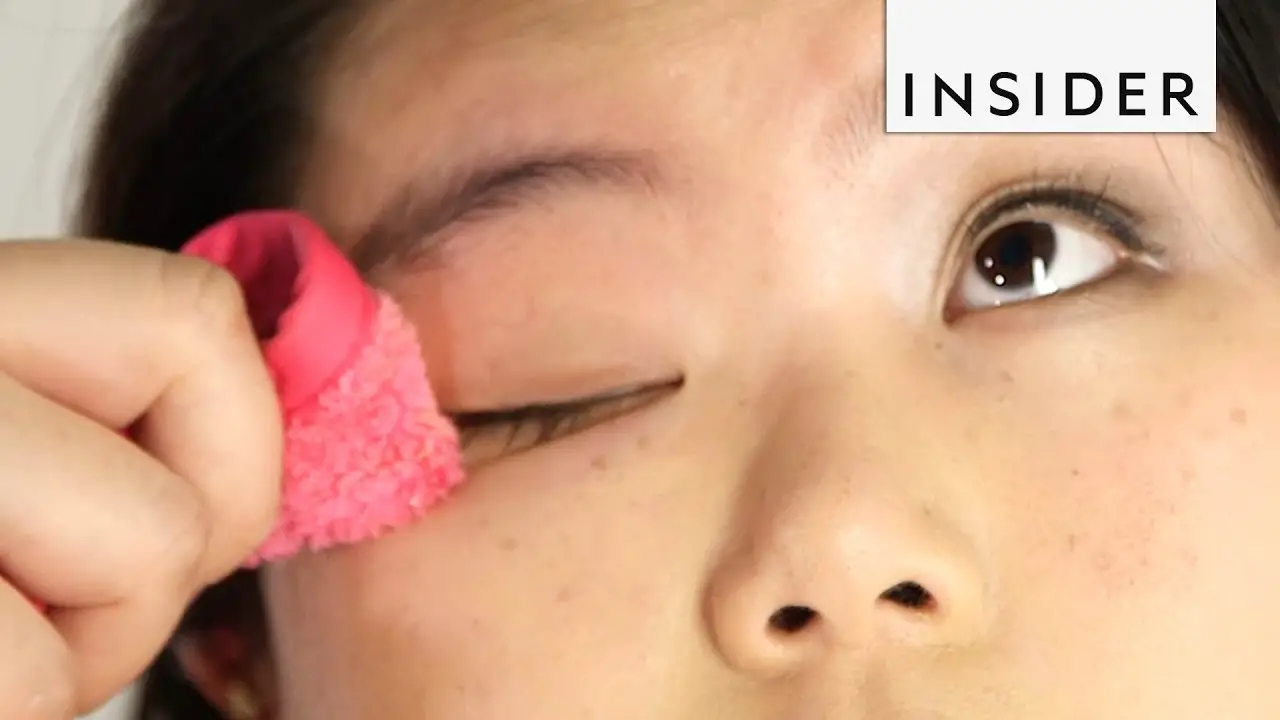Did you know that water alone can be an effective method for removing makeup? It may seem surprising, but water has some amazing properties that make it a useful tool in the beauty routine. While many people rely on makeup removers and cleansers, water can provide a natural and gentle alternative for removing makeup without any additional products. It is a simple and accessible method that has been used for centuries.
Throughout history, water has been used as a cleansing agent for the skin. In ancient times, people would use water along with various ingredients like oils and herbs to cleanse their faces. Water is known for its ability to dissolve certain types of makeup, such as powders and water-soluble products. However, it may not be as effective in removing heavy or waterproof makeup. In such cases, using a gentle makeup remover or cleanser in combination with water can provide better results. So, while water alone may not remove all types of makeup, it can still be a valuable part of your skincare routine.
While water can remove some makeup, it’s not always effective in removing all types of makeup, especially waterproof or long-lasting products. Water alone may not be enough to break down the oils and pigments in makeup. To ensure thorough removal, it’s recommended to use a gentle makeup remover specifically designed to dissolve makeup and cleanse the skin without causing irritation. Choose a product that suits your skin type and follow the instructions for best results.

Removing Makeup with Water: The Truth Unveiled
Makeup is an essential part of many people’s daily routines, helping to enhance their natural features and boost their confidence. But at the end of the day, the task of removing makeup can be a tedious and time-consuming process. Many individuals wonder if it’s possible to remove makeup with just water, without the need for makeup remover or other cleansing products. In this article, we will explore the effectiveness of using water alone to remove makeup and provide you with all the information you need to know.
Let’s dive in and reveal the truth behind removing makeup with water.
The Science Behind Makeup Removal
To understand whether water alone can effectively remove makeup, it’s important to delve into the science behind makeup removal. Makeup consists of various substances such as oils, pigments, and waxes, which can adhere tightly to the skin. Water, on its own, does not possess the ability to dissolve these substances adequately.
Makeup removers, on the other hand, are specifically formulated to break down and remove these substances from the skin. They often contain oil-based ingredients or surfactants that help to dissolve and lift away the makeup. Therefore, relying solely on water may not be sufficient to achieve a thorough and effective makeup removal.
However, water can still play a role in the makeup removal process by hydrating the skin, making it easier to remove certain types of makeup. Additionally, using water in conjunction with gentle cleansing techniques can help eliminate some of the surface-level makeup, dirt, and debris.
Pros and Cons of Using Water for Makeup Removal
Now that we understand the limitations of water in removing makeup, let’s explore the pros and cons of relying solely on water for this task.
Pros:
- Cost-effective: Water is readily available and doesn’t require additional purchases.
- Hydrating: Water can help moisturize the skin during the makeup removal process.
- Gentle: Water is a natural and gentle option for individuals with sensitive skin.
Cons:
- Ineffective for heavy or waterproof makeup: Water alone may not be enough to effectively remove heavy or waterproof makeup.
- Time-consuming: Relying solely on water for makeup removal can take longer compared to using dedicated makeup removers.
- May not fully cleanse the skin: Water may not thoroughly cleanse the skin, leaving behind traces of makeup or impurities.
Tips for Using Water in Your Makeup Removal Routine
If you still prefer to use water in your makeup removal routine, here are some tips to ensure a more effective process:
1. Start with warm water
Warm water helps to open up the pores and facilitates the loosening of makeup. Rinse your face with warm water before proceeding with the removal process.
2. Use gentle cleansing techniques
Instead of harsh scrubbing, opt for gentle techniques such as lightly massaging the skin in circular motions. This helps to break down the makeup without causing unnecessary irritation.
3. Consider using a face cloth or sponge
Using a soft face cloth or sponge can help remove makeup more effectively compared to using just your hands and water. The slight abrasiveness of the cloth or sponge aids in dislodging makeup particles from the skin’s surface.
4. Follow up with a gentle cleanser
After using water to remove the majority of the makeup, it’s essential to follow up with a gentle cleanser to ensure that any residual makeup and impurities are thoroughly eliminated.
Makeup Removal Alternatives to Water
If you’re not satisfied with the efficacy of water alone, there are alternative methods you can consider for makeup removal:
1. Micellar water
Micellar water is a popular option for makeup removal, especially for individuals with sensitive skin. It contains tiny oil molecules called micelles that attract and remove dirt, oil, and makeup without the need for rinsing.
2. Oil-based cleansers
Oil-based cleansers are effective in breaking down and dissolving makeup. They can be applied directly to dry skin and then emulsified with water to rinse away the makeup.
3. Makeup remover wipes
Makeup remover wipes are convenient for on-the-go makeup removal. They are pre-moistened with cleansing ingredients that help to dissolve and remove makeup.
The Verdict: Water Alone Isn’t Enough
While water can be a part of your makeup removal routine, it’s important to acknowledge that it may not be sufficient on its own. Water can help hydrate the skin and remove some surface-level makeup, but it lacks the ability to effectively break down and remove all types of makeup, especially heavy or waterproof formulas.
To ensure a thorough and effective makeup removal, it’s recommended to use dedicated makeup removers or alternative cleansing methods mentioned earlier in this article. These products are specifically formulated to target stubborn makeup and provide a more comprehensive cleanse for your skin.
Remember, taking off your makeup at the end of the day is crucial for maintaining the health and appearance of your skin. So, while water may play a small role in the process, it’s best to rely on suitable makeup removers for a more effective and enjoyable makeup removal experience.
Key Takeaways: Can You Remove Makeup with Water?
- Water alone is not enough to completely remove makeup.
- Makeup removers are specifically designed to dissolve and remove makeup effectively.
- Using water alone may smear the makeup and leave residue on the skin.
- Makeup removers come in various forms, such as cleansing oils, micellar waters, and wipes.
- It’s important to cleanse the skin thoroughly after removing makeup to ensure it is clean and free from residue.
Frequently Asked Questions
Here are some common questions and answers regarding the use of water to remove makeup:
1. Can water effectively remove all types of makeup?
Water alone is not always sufficient to remove all types of makeup. While it may help with lighter makeup, more stubborn products like waterproof mascara or long-wearing foundation may require additional cleansing steps.
To ensure complete removal, it is recommended to use a gentle cleanser specifically formulated for removing makeup, followed by rinsing with water.
2. What are the limitations of using water to remove makeup?
Water alone may not effectively remove heavy or waterproof makeup, especially if it is oil-based or contains long-lasting ingredients. In these cases, using a dedicated makeup remover or cleansing oil can provide better results.
Additionally, some water-soluble makeup products may leave residue behind even after rinsing with water. To ensure a completely clean face, it is recommended to double cleanse or use a micellar water after initial makeup removal with water.
3. Can water remove all traces of eye makeup?
While water can help remove some traces of eye makeup, it may not be sufficient for completely removing all types of eye makeup, especially waterproof mascaras or long-wearing eyeliners.
For effective removal, it is recommended to use a separate eye makeup remover or a gentle cleanser specifically formulated for the eye area.
4. Is it safe to only use water to remove makeup?
Using water alone to remove makeup is generally safe for most individuals, especially when using gentle rinsing and patting dry with a clean towel.
However, it is important to note that some makeup products, especially those containing long-lasting or waterproof formulas, may require additional cleansers or makeup removers to ensure complete removal. It is always a good idea to follow up with a skincare routine to cleanse and moisturize the skin after makeup removal.
5. What are the benefits of using water to remove makeup?
Using water to remove makeup has several benefits. It is cost-effective, readily available, and generally suitable for all skin types.
Water is a natural and gentle option for removing everyday makeup. It can help refresh the skin, remove surface impurities, and prepare the skin for further cleansing and skincare routines.
What to Use Instead of Makeup Wipes
In summary, removing makeup with just water is not always effective. Water alone may not be able to fully remove all types of makeup, especially long-wearing or waterproof formulas.
Using a gentle cleanser or makeup remover specifically designed for the type of makeup you are wearing is the most effective way to ensure thorough removal without irritating your skin.






Leave A Comment